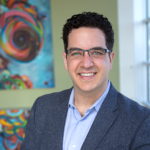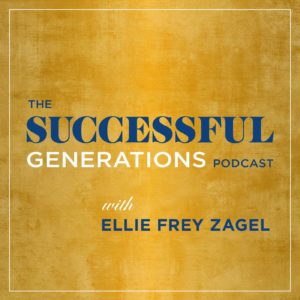
Back in episode 026 my guest Rob Collier, President of the Council of Michigan Foundations mentioned giving circles as a trend to watch in philanthropy. To take a deeper dive into giving circles, I’m joined by my long-time friend and self-proclaimed “philanthropy geek” Jason Franklin, Ph.D.
Jason is the W.K. Kellogg Chair in Community Philanthropy at the Dorothy A. Johnson Center for Philanthropy, Grand Valley State University. In November 2017, he and his colleagues with the Collective Giving Research Group released a report called The Landscape of Giving Circles/Collaborative Giving Groups in the U.S. (link in resources below).
During our interview, Jason defines what a giving group is, how and why you should consider joining one, and some best practices to help you find success.
Find Jason at www.johnsoncenter.org and reach him at jason_franklin@gvsu.edu.
Topics discussed in this episode:
- Jason’s philanthropy story (3:00)
- Jason’s circles (6:00)
- Defining a giving circle (8:21)
- A popular giving vehicle (9:40)
- Why join (15:55)
- How to start (19:00)
- Best practices (22:23)
- The lifespan (32:00)
- Importance of purpose (34:06)
- How much to give (36:35)
- Favorite resources (40:20)
- What does failure look like? (43:04)
- How to find Jason (47:15)
- Bonus questions (47:42)
Guest Bio:

Dr. Jason Franklin was appointed in June 2015 as the W.K. Kellogg Community Philanthropy Chair at the Johnson Center for Philanthropy, to which he brings a background in grantmaking and donor education, nonprofit strategy and leadership, social entrepreneurship, and community organizing and advocacy. As holder of the nation’s first endowed chair focused on community philanthropy, he engages in research, teaching, service, and thought leadership to explore and advance the field, nationally and internationally. This includes work exploring (1) how we give better together through networks and vehicles for collective giving and (2) how we strengthen our giving practices to communities we care deeply about, both place-based and communities of identity. He is a leading voice in the field on issues of collective giving, social justice philanthropy, and broader trends in charity and social change and a regular commentator in the media on these topics in publications ranging from the New York Times, ABC News, and Wall Street Journal to the Chronicle of Philanthropy, NonProfit Times, Alliance Magazine and more.
In addition to his work as the Kellogg Chair, Dr. Franklin is a Visiting Fellow at Stanford University’s Center on Philanthropy & Civil Society and a strategic advisor to the Peterffy Foundation and several individual donors. He serves as board chair of the Proteus Fund, co-founder and co-chair of the Solidaire Donor Network, and on the boards of WiserGiving and the Michigan Alliance. He is also an advisory board member of the Chartered Advisors in Philanthropy Program, Amplifier, Our LGBT Fund at the Grand Rapids Community Foundation, and the Movement Voter Project. He is a member of the Democracy Alliance, Threshold Foundation and their High Impact Documentary Funding Circle, and WINGS: Worldwide Initiatives for Grantmaker Support where he co-chairs their Academic Affinity Group.
Notable & Quotable:
A giving circle is a group of people coming together to pool money and decide together about where to give that money. —Dr. Jason Franklin, #successfulgenerations #familyphilanthropy #givingcircles
People like giving circles because they can learn with each other, share the risks or make a bigger impact, and simply not feel so isolated in their giving. —Dr. Jason Franklin, #successfulgenerations #familyphilanthropy #givingcircles
The number of giving circles has tripled since 2007. In our research, we identified 1,600 giving circles that had collectively given away over $1.3 billion. —Dr. Jason Franklin, #successfulgenerations #familyphilanthropy #givingcircles
Giving circles are female dominated. They also engage more diverse donors. —Dr. Jason Franklin, #successfulgenerations #familyphilanthropy #givingcircles
The amount to join a giving circle can range from $50 to $1 million. —Dr. Jason Franklin, #successfulgenerations #familyphilanthropy #givingcircles
The reality is that doing work collectively and collaboratively takes time and energy, and has real costs. It’s unfair to assume someone else will take care of it. It’s important to have clear expectations and a plan for this. —Dr. Jason Franklin, #successfulgenerations #familyphilanthropy #givingcircles
Resources mentioned in this episode:
- Report: The Landscape of Giving Circle and Collaborative Giving Groups in the U.S.
- Asian American Pacific Islanders in Philanthropy
- Latino Community Foundation Giving Circle Network
- Community foundation locator
- Amplifier
- Amplifier Giving Circle QuickStart PDF
- Women’s Collective Giving Network
- Impact100
- Social Venture Partners
- Funding Queerly
- LGBT Fund at Grand Rapids Community Foundation
Right Click and “Save As” to download this episode to your phone.
Subscribe now!
Don’t risk missing out on any of the fun that is to come.
Sign up for our weekly newsletter!
Want more of Successful Generations? Check out our other episodes:
Learn more about Successful Generations:
FB: @SuccessfulGenerations
Twitter: @EllieFreyZagel
Email: ellie@successfulgenerations.com
Instagram: SuccessfulGenerations
Have a topic suggestion?
If you are the next generation of family business, philanthropy and wealth, and have a topic you think we should discuss, let us know at Ellie@successfulgenerations.com.



